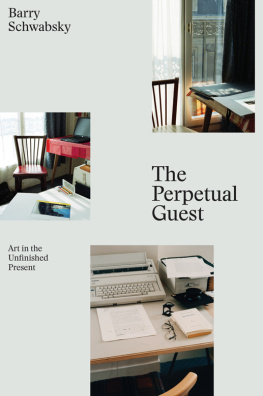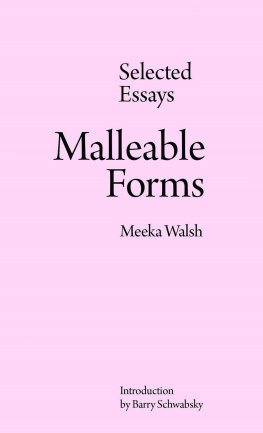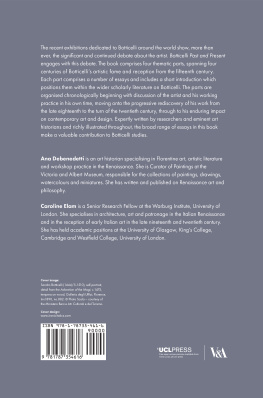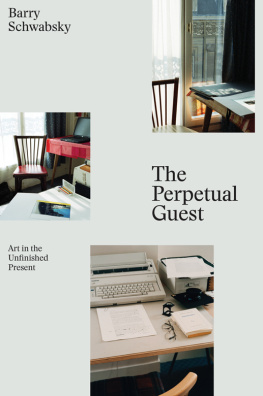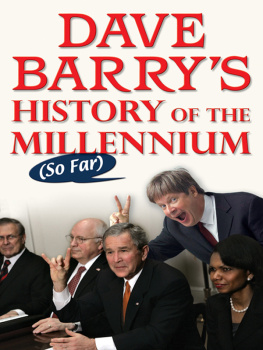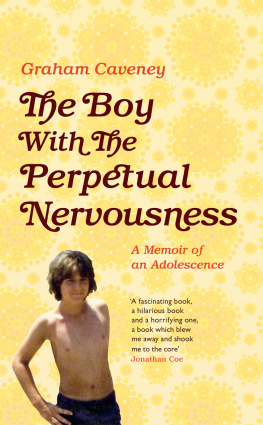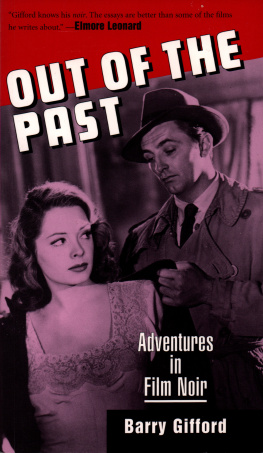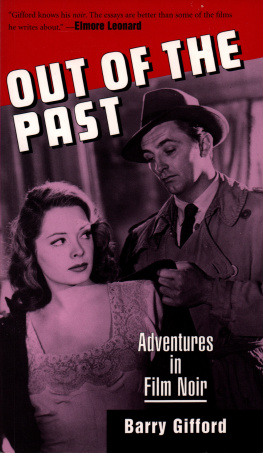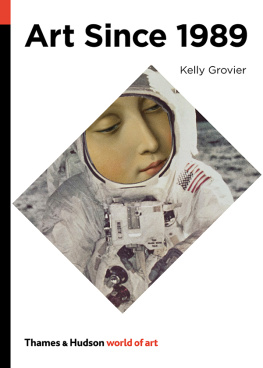The Perpetual Guest
Art in the Unfinished Present
BARRY SCHWABSKY

First published by Verso 2016
Barry Schwabsky 2016
The essays collected here originally appeared in the pages
of the Nation between 2006 and 2014
All rights reserved
The moral rights of the author have been asserted
1 3 5 7 9 10 8 6 4 2
Verso
UK: 6 Meard Street, London W1F 0EG
US: 20 Jay Street, Suite 1010, Brooklyn, NY 11201
versobooks.com
Verso is the imprint of New Left Books
ISBN-13: 978-1-78478-324-2
ISBN-13: 978-1-78478-323-5 (HB)
eISBN-13: 978-1-78478-325-9 (US)
eISBN-13: 978-1-78478-326-6 (UK)
British Library Cataloguing in Publication Data
A catalogue record for this book is available from the British Library
Library of Congress Cataloging-in-Publication Data
Names: Schwabsky, Barry, author.
Title: The perpetual guest : art in the unfinished present.
Description: New York : Verso, 2016. | The essays collected here originally
appeared in the pages of the Nation between 2006 and 2014.
Identifiers: LCCN 2015042580| ISBN 9781784783235 (hardback) | ISBN
9781784783242 (paperback)
Subjects: LCSH: Art. | BISAC: PHILOSOPHY / Political.
Classification: LCC N7445.2 .S385 2016 | DDC 700dc23
LC record available at http://lccn.loc.gov/2015042580
Typeset in Perpetua by Hewer Text UK Ltd, Edinburgh, Scotland
Printed in the US by Maple Press
For Davida and Willa and their unfinished future
Contents
Art was no part of my milieu when I was growing up, so neither was art criticism. I must have first heard tell of that profession in the movies. I have a vague recollection of a horror film about the enmity between an artist, who declares, I live by my hand! and a critic, whose motto is, I live by my eye! After the critic murders the artist, a pair of disembodied hands takes revenge by tearing out his eyes.
And yet I remember, too, the grade-school art teacher who showed us reproductions of Picasso and Matisse. When I made a crayon drawing of some downhill skiersof course Id never seen a ski slope any more than Id met an art criticshe gave particular praise to my decision to show one of the skiers cut off by the bottom edge of the paper. She thought this was very sophisticated. I didnt understand what the big deal was. That was probably my first practical experience of art criticism. It gave me my first dim awareness that what someone sees in a picture is not necessarily just what its maker meant to put into it.
Many years later, I learned of Marcel Duchamps view, usually paraphrased as the viewer completes the work. Its a slogan I repeat regularly. More precisely, Duchamp proposed that the creative act is not performed by the artist alone; the spectator brings the work in contact with the external world by deciphering and interpreting its inner qualification and thus adds his contribution to the creative act. I suspect he didnt knowas I didnt until after I was already familiar with Duchamps dictumthat Walt Whitman had long before declared that the reader is to do something for himself, must be on the alert, must himself or herself construct indeed the poem, argument, history, metaphysical essaythe text furnishing the hints, the clue, the start or frame-work. Not the book needs so much to be the complete thing, but the reader of the book does.
It was thus Duchamp who gave me a ready answer to an artist friend who once challenged me with the question, Why do we need art critics? After all, she continued, Scientists dont need science critics. Why is art any different? And its true, there are no science critics. Yes, scientists doing a peer review are in a sense acting as judges of their fellow scientists workbut only in a sense: they are acting as fellow practitioners, not as critics. Thats because science is not founded on this compact between maker and receiver. The art critic is a person who formalizes and deliberately exemplifies the role of the spectator who realizes the artists work, not by leaving it just as it is, but by adding something to it, making a personal contribution.
If the art critic is, as I say, merely the self-appointed representative of the spectator who is ontologically essential to arts existence, then the validity of the critics role ought to be assured. But that doesnt seem to be the case. Its not, as might have been true at times in the past, that the critic is too powerful, figuratively murdering with his evil eye the poor artist whos just trying to live by his hand. Instead, or so one gathers from all the articles and symposia on the crisis of art criticism, the critic seems to be losing all influence. The overheated, ever-expanding art market on the one hand and the explosive growth in the number of big international public exhibitions on the other has rendered the critics aesthetic judgment of taste superfluousthat seems to be the idea. The critic no longer has the power to participate in forming a consensus of value. Somewhere above his or her head, the collectors and the curators are doing that. The critic can either tag along after or get left behind altogether.
Theres some truth to this story of the critic superseded by collectors and curators. The roles and the motivations of collectors and curators are different, but they have this in common: they command material resources (private in one case, usually public in the other) that can help chosen artists to produce their work, to make a living, and to gain exposure and reputation. Critics have only words at their disposalliterally so, more and more, as the transformation of publishing by the Internet has made it ever harder for writers and journalists of any description to earn a living. And in the neoliberal economy of recent decades, with its relentless upward redistribution of wealth, money talks louder than ever, drowning out other forms of discourse.
I have to admit that the art critics loss of power doesnt worry me much. I dont see my job as mainly that of making or breaking artists reputations, or of informing collectors or curators of what they ought to like and buy. Im just as happy that they dont listen to me. I have other responsibilities toward art. The meaning of an artwork is finally independent of its price and of its exhibition history because its made and remade by anyone prepared to formulate a contribution to the creative act already embodied in it.
If there were a real crisis for criticism, it would have to do instead with an inner transformation in the nature of art itself. What if it no longer requires a public, that is, someone like the active spectator of whom Duchamp spoke? Then there really would be a conundrum, for the critic would no longer have a position from which to grasp the artwork. Its not impossible, and its not even a new idea. Back in 1966, for instance, Allan Kaprow was calling for the elimination of the audience. In recent years, in great part as a result of their revulsion from the financialization and globalization of art, more and more artists have been taking this idea more seriously, wanting to work without an audience but only with participants, collaborators, communities. Nicolas Bourriaud, in his 1998 book Relational Aesthetics, quoted Flix Guattaris question, How can you bring a classroom to life as though it were an artwork? As it turns out, the question for many was more like: How can you turn an artwork into a classroom? Whether this would be worth doing is not the issue here; its that to succeed in doing soto eliminate the disinterested publicwould also be to eliminate any role for the critic. A subjective response from a participant would lack the sense of spectatorial distance essential to criticism; and an objective account would not be criticism but reportage.

